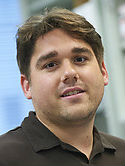Structural design of engineered costimulation determines tumor rejection kinetics and persistence of CAR T cells Journal Article
| Authors: | Zhao, Z.; Condomines, M.; Van Der Stegen, S. J. C.; Perna, F.; Kloss, C. C.; Gunset, G.; Plotkin, J.; Sadelain, M. |
| Article Title: | Structural design of engineered costimulation determines tumor rejection kinetics and persistence of CAR T cells |
| Abstract: | T cell engineering is a powerful means to rapidly generate anti-tumor T cells. The costimulatory properties of second-generation chimeric antigen receptors (CARs) determine the overall potency of adoptively transferred T cells. Using an in vivo "stress test" to challenge CD19-targeted T cells, we studied the functionality and persistence imparted by seven different CAR structures providing CD28 and/or 4-1BB costimulation. One configuration, which uses two signaling domains (CD28 and CD3ζ) and the 4-1BB ligand, provided the highest therapeutic efficacy, showing balanced tumoricidal function and increased T cell persistence accompanied by an elevated CD8/CD4 ratio and decreased exhaustion. Remarkably, induction of the IRF7/IFNβ pathway was required for optimal anti-tumor activity. Thus, 1928z-41BBL T cells possess strikingly potent intrinsic and immunomodulatory qualities. © 2015 Elsevier Inc. |
| Journal Title: | Cancer Cell |
| Volume: | 28 |
| Issue: | 4 |
| ISSN: | 1535-6108 |
| Publisher: | Cell Press |
| Date Published: | 2015-10-12 |
| Start Page: | 415 |
| End Page: | 428 |
| Language: | English |
| DOI: | 10.1016/j.ccell.2015.09.004 |
| PROVIDER: | scopus |
| PUBMED: | 26461090 |
| PMCID: | PMC5003056 |
| DOI/URL: | |
| Notes: | Export Date: 2 November 2015 -- Source: Scopus |
Altmetric
Citation Impact
BMJ Impact Analytics
MSK Authors
Related MSK Work











